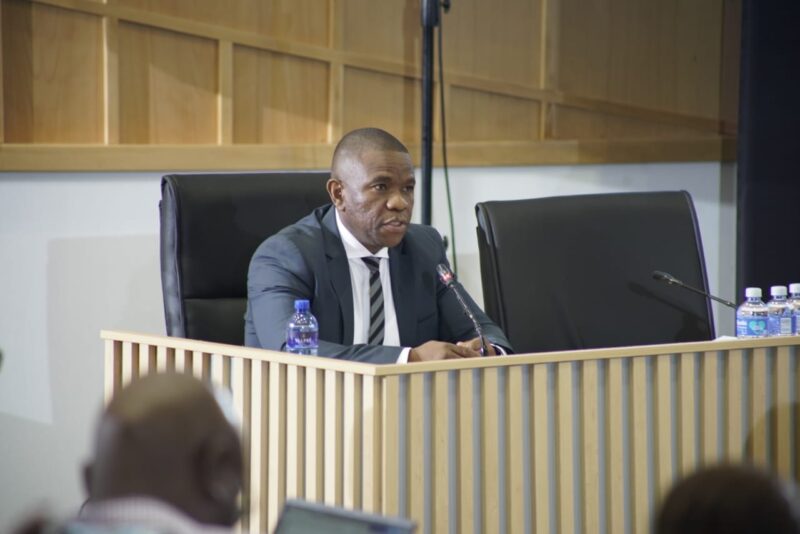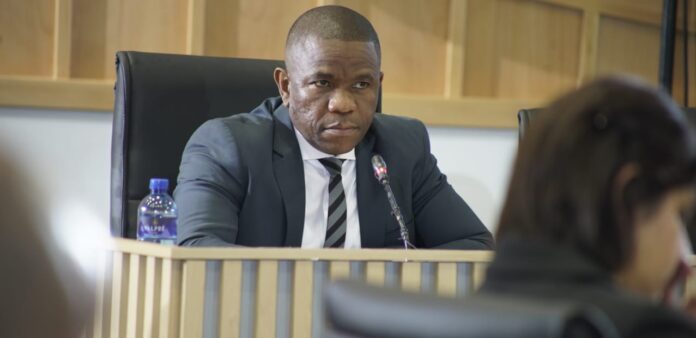KwaZulu-Natal (KZN) police commissioner Lt-Gen Nhlanhla Mkhwanazi said “someone influenced” police minister Senzo Mchunu to disband the South African Police Service (SAPS) political killings task team in KZN.
Mkhwanazi was speaking on Wednesday during the official start of the Judicial Commission of Inquiry into criminality, political interference, and corruption at the Brigitte Mabandla Justice College in Pretoria.
The commission is chaired by retired Constitutional Court Justice Mbuyiseli Madlanga.
Focus on WhatsApp messages
During the start of his public testimony on Wednesday, Mkhwanazi told evidence leader Advocate Mahlape Sello SC that on January 2 2025 he received a WhatsApp message from a “friend”.
“The message contained a signed letter by the police minister [Mchunu] dated December 31 2024 speaking about the de-establishment of the political killings task team,” said Mkhwanazi.
“The minister’s letter was dealing with an operational matter. And according to the law, the minister can only give policy direction and not operational direction on police matters. Someone influenced the minister to do this…,” said Mkhwanazi.
Mkhwanazi said upon receiving the January 2 2025 WhatsApp message with the letter, he contacted Mchunu’s chief of staff to confirm if the letter was authentic. He said Mchunu’s chief of staff confirmed the authenticity of the letter.
He said after this, he asked national police commissioner Gen Fannie Masemola if he was aware of the decision by Mchunu to disband the political killings task team.
“The national commissioner said he had not had the opportunity to consider the contents of the letter. And he has nothing to do with its disbanding. He said the minister did not engage him on the disbanding,” said Mkhwanazi.

He said he sent Mchunu a WhatsApp message asking for a meeting with the minister to ask him why he took the decision to disband the political killings task team.
“I sent him a WhatsApp message, and he acknowledged my message and said we will have a meeting. To date, that meeting has not happened,” said Mkhwanazi.
Mchunu got influenced
“Someone influenced the minister to disband the task team… The communication in the syndicates involving associates of the minister seems to suggest the minister is involved in decisions the syndicate is taking… The minister disbanded the team because it was helping the Gauteng counterintelligence unit…
“The minister’s decision to isolate the task team and disband it raises questions. [And] the reasons for disbanding the task team are unknown to me… The minister said in parliament [in March 2025] that he engaged the president [Cyril Ramaphosa] before taking this decision to disband the task team…,” said Mkhwanazi.

Mkhwanazi, who is the commission of inquiry’s first witness, said the bulk of his testimony will be about the work of the KZN SAPS political killings task team and on criminality, political interference, and corruption in the criminal justice system.
Wednesday’s proceedings adjourned at 4pm.
The commission will resume its proceedings on Thursday at 9.30am with the continuation of Mkhwanazi’s testimony.
Explosive claims triggered inquiry
During a media briefing on July 6, 2025, Mkhwanazi said he is in possession of WhatsApp communication between controversial Gauteng tenderpreneur Vusimuzi “Cat” Matlala and Brown Mogotsi, a comrade of Mchunu. They were allegedly discussing how Mogotsi is working to get Mchunu and deputy national police commissioner for crime detection Lt-Gen Shadrack Sibiya to interfere and suppress the police investigations into Matlala.
Mkhwanazi said he has proofs of payment showing that Matlala funded the ANC political activities and events of Mchunu and Mogotsi. Mkhwanazi said he believes that Mchunu and Sibiya took a decision to disband the KZN SAPS political killings task team because it raided Matlala’s home in December 2024. Also because it was making inroads in certain Gauteng cases.
Gauteng criminal syndicates
He added that Mchunu and Sibiya decided to disband the KZN SAPS political killings task team because it unmasked a criminal syndicate operating in Gauteng.
Mkhwanazi said the criminal syndicate consists of senior politicians serving as members of parliament. Also law enforcement officers such as police officers, metro police officers, correctional service officials, prosecutors in Gauteng, and magistrates and judges in Gauteng.
He said the aforementioned politicians, law enforcement officers, and members of the judiciary are controlled by drug cartels and businesspeople in Gauteng.
Following Mkhwanazi’s explosive media briefing, Ramaphosa established a judicial commission of inquiry to investigate the allegations.
Ramaphosa placed Mchunu on special leave. While national Police Commissioner Gen Fannie Masemola placed Sibiya on special leave as well.



